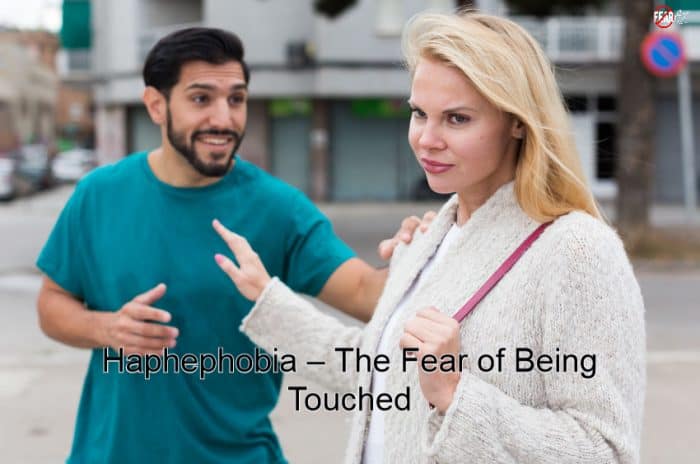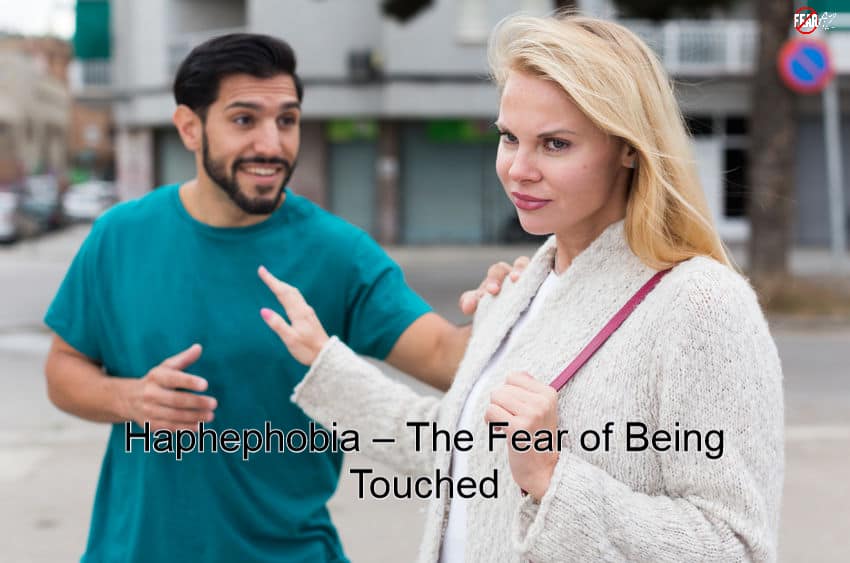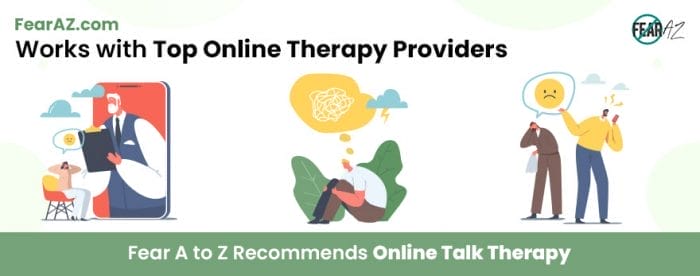Share This Article
Excessive Fear of Being Touched without Consent
Do you shiver at the thought of being touched? Are you averse to the feel of someone else’s skin against yours?
Many are uncomfortable being touched without consent or by strangers. But in your case, being touched by other people— even by family or friends—elicits intense feelings of fear or perhaps even pain. The fear may persist for a long time and may be so intense that it destabilizes your personal relationships.
If this is the case for you, then you may be struggling with haphephobia, an anxiety disorder characterized by an extreme, irrational fear of being touched.
Other names for haphephobia?
The fear of being touched is also named thixophobia, chiraptophobia and aphenphosmphobia.
What Is Haphephobia?
Haphephobia is defined as a person experiencing extreme fear of panic when touched. In most cases, the fear is being touched by the opposite gender or a specific individual. But in some extreme cases, a sufferer of this phobia cannot stand to be touched by anyone.
For many sufferers of this disorder, the intensity of their phobia is linked to the condition’s cause. A few potential haphephobia causes include sexual abuse, a past experience of having been harmed, and a morbid fear of germs. In other cases, they might have inherited the trait from parents and guardians who also expressed an aversion to being touched.

The fear of being touched is also linked to two other mental disorders: obsessive-compulsive disorder (OCD) and post-traumatic stress disorder (PTSD). OCD is an irrational desire to be in control of every personal situation. The thought of not knowing where other people’s hands may have been before the touching is a major concern. PTSD comes as a result of the sufferers’ memory of a traumatic event, such as an assault or rape.
To escape experiencing severe reactions, haphephobia sufferers avoid being touched altogether. They keep their distance and isolate themselves, putting a strain on their social relationships, careers, and quality of life.
Common Haphephobia Symptoms
Haphephobia is a devastating condition with severe symptoms and toxic coping practices. Fully convinced that a simple touch can harm them, those with this phobia experience extreme reactions whenever their condition is triggered.
Symptoms may include:
- Freezing up
- Shock
- Panic attacks
- OCD
- Depression
- Self-isolation
- Anxiety disorder
- Trembling
- Becoming hysterical
- Hot flashes
- Cold flashes
- Hyperventilation
- Nausea
- Shortness of breath
Self-Help for Haphephobia
While taking control of the situation is difficult, some self-help activities may help build positive coping skills.
Breathing Exercises
Practicing the art of taking long, deep breaths can help slow down the toxic effects and symptoms of your condition. Taking time out to breathe before or during a triggering moment is a proven way of diverting extreme reactions.
Physical Exercise
This is also a proven way of curbing stress and anxiety-related symptoms. Doctors recommend aerobic exercises to help improve a phobia sufferer’s overall mental health.
Meditation and Relaxation
Meditation and relaxation are also highly recommended for dealing with stress, depression, anxiety, and other phobia symptoms. Learning to focus one’s thoughts on the positives rather than the triggers is one of the best ways for an individual to cope throughout the healing journey and while learning to manage symptoms.
Positive visualization and practicing mindfulness while meditating can help keep track of thought processes and retain control of emotional reactions.
Avoid Caffeine
Caffeine is a known stimulant. A high caffeine intake can induce symptoms that mimic anxiety, such as nervousness, restlessness, and a fast heart rate. Phobia and other anxiety-prone patients are therefore advised against too much caffeine.
Professional Help for Haphephobia
Deciding to seek medical treatment is a significant step toward recovery. Today, a range of treatments are available to help people with haphephobia.
Talk Therapy
Talking out your problems and trauma with a qualified therapist or counselor is a great therapy for phobic sufferers. This approach offers you the opportunity to speak out your feelings and fears, and not just bottle them up inside or avoid confronting them.
The counselor also gets to offer feedback and advise you on what to do next in the course of the treatment. Discussing your phobia also helps you to keep things in perspective and provides clarity on the situation.
Cognitive Behavioral Therapy
The most popular among available haphephobia treatments, cognitive behavioral therapy helps provide you with the tools you need to redirect your thoughts. It also help repattern your behavior to healthier, more rational responses.
Exposure Therapy
Slowly exposing you to your phobia triggers — in this case, touch — is what this treatment is all about. The process may include exercises where the medical provider encourages you to imagine circumstances in which human touch is involved. The therapist strives to create a safe environment where you can slowly allow yourself to become more comfortable with your fears. Exposing you to repeated positive experiences may slowly change your negative emotions toward touch.
Group Therapy
Group therapy is also a viable treatment option for phobic sufferers. This approach encourages vulnerability within a group with similar issues. It provides opportunities to see how others are coping with their symptoms.
The goal is to encourage you to keep pushing forward by letting you know you are not alone and that other people can relate to your situation.
Hypnosis
Hypnosis involves placing you in a subconscious state of mind and encouraging you to confront your innermost fears and thoughts until you can resolve the conflict. This type of treatment could take some time. Also, be aware that this approach is considered an alternative therapy and doesn’t always work on everyone. Nonetheless, hypnosis has been proven helpful in various medical conditions.
Medications
Your health care provider may also recommend medication for phobia, especially in severe or debilitating cases. The medication may ease symptoms and alleviate pain. Medication is only used short term, or until other therapies begin to take effect.
Preparing for the Treatment
If you’re suffering from phobia and thinking of getting help from a medical professional for the first time, expect a lot of questions from your medical provider. Be as detailed as possible when giving information about your condition. Doing so is important so that your medical provider can recommend the best treatment for you.
Common questions asked include:
- What prompted you to seek therapy?
- When did you first notice your symptoms?
- When are your symptoms likely to occur? What thoughts go through your mind before your symptoms begin?
- Do you notice things that make your symptoms seem better or worse?
- How are your symptoms affecting you and the those around you?
- What coping strategies have you tried so far?
- Are you undergoing treatment for any other medical conditions?
Conclusion
People with hapnophobia, or the fear of being touched, can lead productive, fulfilling lives. If you’re suffering from haphephobia, know that you’re not alone, and help is available.




